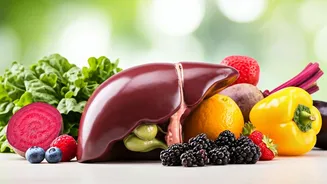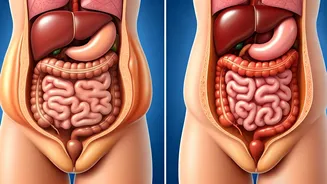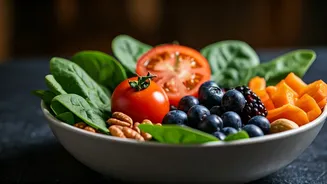Liver's Crucial Role
The liver is a vital organ performing hundreds of functions within the body. It acts as a filter, removing toxins and waste, and is essential for processing
nutrients, producing bile for digestion, and storing energy. Dietary choices significantly affect liver function. Consuming a diet rich in processed foods, unhealthy fats, and excessive sugar can overburden the liver and lead to various health problems. Conversely, a diet focusing on whole foods, fruits, vegetables, and lean proteins can support liver health. Incorporating specific foods known for their liver-boosting properties is a proactive approach to maintaining this crucial organ's well-being. By understanding the importance of the liver and the impact of food choices, individuals can make informed decisions to promote a healthier liver and overall better health.
Coffee's Liver Benefits
Coffee is often included in lists of foods beneficial for liver health, backed by numerous studies. Regular coffee consumption has been linked to a decreased risk of liver disease, including cirrhosis and liver cancer. The protective effects are attributed to several compounds in coffee, which can help reduce inflammation and oxidative stress, both of which are common in liver damage. Coffee appears to enhance the liver's ability to filter toxins, thus alleviating the burden on the organ. For individuals aiming to support their liver function, adding a moderate amount of coffee to their daily routine could be a beneficial addition. Of course, it's essential to consume coffee responsibly, keeping in mind the individual's caffeine sensitivity and any existing health conditions.
The Power of Green Tea
Green tea is packed with antioxidants, which can help shield the liver from damage caused by harmful free radicals. These antioxidants, primarily catechins, possess potent anti-inflammatory properties, providing a shield against liver inflammation. Studies suggest that regular green tea consumption can improve liver enzyme levels and protect against non-alcoholic fatty liver disease (NAFLD), a common condition. Furthermore, green tea can help lower cholesterol levels, reducing the likelihood of developing fatty liver. Making green tea a staple in your daily intake is a convenient and enjoyable way to improve liver health. For the best outcome, it is recommended to opt for high-quality green tea and avoid adding excessive sugar or sweeteners, allowing you to reap the complete benefits this beverage offers.
Cruciferous Vegetable Advantage
Vegetables belonging to the cruciferous family, such as broccoli, cauliflower, Brussels sprouts, and kale, are powerhouses for liver health. They contain compounds that support the liver's detoxification process by increasing the production of enzymes that neutralize harmful substances. These vegetables are rich in fiber, which aids in flushing out waste products and promotes healthy digestion, thereby decreasing strain on the liver. The anti-inflammatory properties of cruciferous vegetables can also help mitigate liver damage. Including these vegetables in your diet is a simple yet impactful way to improve liver function. They can be consumed in various ways—steamed, roasted, sautéed—or even added to smoothies, ensuring that you incorporate a variety of nutrients while taking care of your liver.
Berries: Nature's Antioxidants
Berries, like blueberries, raspberries, and cranberries, are teeming with antioxidants, protecting the liver from oxidative stress and damage. Antioxidants help neutralize free radicals, which can contribute to liver cell injury. These berries are also rich in fiber, assisting in the removal of waste and supporting optimal liver function. Certain berries contain specific compounds that can aid in reducing liver inflammation and enhancing liver enzyme levels. Incorporating berries into your diet is a flavorful and healthy approach to support liver function. Whether enjoyed fresh, added to yogurt or oatmeal, or included in smoothies, berries offer a delicious way to improve overall health and liver well-being.
Nuts and Seeds' Benefits
Nuts and seeds, such as walnuts, almonds, flaxseeds, and chia seeds, are sources of healthy fats, antioxidants, and fiber. The healthy fats found in nuts and seeds help reduce the accumulation of fat in the liver, which is especially important for individuals susceptible to fatty liver disease. The antioxidants help protect the liver cells from damage and inflammation. The high fiber content promotes healthy digestion and helps eliminate toxins, reducing the burden on the liver. Nuts and seeds are versatile and can be readily integrated into your daily diet. They can be enjoyed as snacks, added to salads and cereals, or used in various recipes. Regular consumption of nuts and seeds is a convenient and effective method for supporting liver health.











